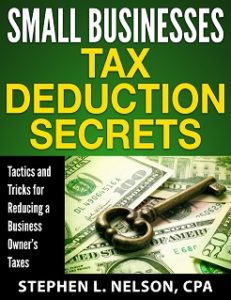 Because we’re CPAs, we get people asking us a lot about when someone can and can’t use TurboTax or a similar product to self-prepare a tax return.
Because we’re CPAs, we get people asking us a lot about when someone can and can’t use TurboTax or a similar product to self-prepare a tax return.
This is a great question.
Our standard answer? You should try to do your own individual tax return.
Most people—nearly everyone in fact—can use a product like TurboTax to do their own tax return. (Er, no, we’re not earning some backdoor commission from Intuit for making this statement.)
Where Things Get Tricky
In a handful of special situations, however, you probably want to outsource the project to an expert like a CPA who specializes in taxes or an experienced enrolled agent.
U.S. tax law is, I’m sorry to have to report, absurdly complicated in many areas.
Furthermore, in some areas, the penalties for innocently goofing stuff up are astronomical.
Finally, as a general trend, public policymakers more and more place the burden of this complexity on businesses (and other organizations such as nonprofits and government entities), as opposed to individual taxpayers.
Where does this leave you? Well, as noted, we think most individuals can probably do their own tax returns with the help of good tax software.
In contrast, we think most businesses benefit by working with a good, professional adviser so they understand their reporting obligations and so they optimize their tax burden.
Example: The Form W-2 provides a convenient example of this. Employers need to understand payroll and income tax laws well enough to properly fill these forms out, but the form is cookie-cutter enough that usually all an employee needs to do is copy their W-2 into TurboTax.
And now let me flesh out this discussion by pointing out a handful of exceptions to our general suggestion.
Exception #1: You Have Foreign Income or Investments
The first exception to our “hey, just do it yourself with TurboTax” suggestion concerns people with an international footprint.
U.S. taxpayers owe tax on worldwide income, not just U.S. income. This means US taxpayers with offshore income need to report that income—or in some cases report that they don’t have offshore income when the IRS might think they should.
Here’s the rub, though: The IRS doesn’t have the power to force non-U.S. entities to fill out their cookie-cutter forms. So often dealing with this stuff overwhelms a TurboTax user.
And then let me mention one other danger in all this. Offshore accounts and investments often require rather detailed disclosures by the taxpayer.
Failing to provide these disclosures may trigger catastrophic penalties. The so-called FBAR comes with big penalties that get assessed in $10,000 increments.
And the FATCA rules make FBAR look like kindergarten.
Note: We’ve got more detailed information on the FBAR and FATCA rules here.
Exception #2: You Own an Unincorporated Small Business or Rental Property
A quick point that goes back to something I said a few paragraphs ago…
Tax laws, as noted earlier, place the burden of complexity on businesses. This applies to small unincorporated businesses, too. And also to single-member LLCs.
Accordingly, even rather small-time operations may need outside expert assistance. This can seem unfair, but if there’s good news here, it’s that many solo practitioner CPAs and EAs specialize in serving really small businesses. And so you may be able to find a great local tax accountant.
Exception #3: You Receive a Schedule K-1
On to another exception…
If you’ve invested in, or in some other way ended up with, an interest in a pass-through entity, you need to call in an expert in many cases.
Here’s why: With pass-through entities, such as partnerships and S corporations, income and deductions retain their character as they “pass through” the entity to the owners.
Note: Trusts and estates provide K-1s to their beneficiaries, too. Just FYI…
What this means for individuals who own an interest in pass-through entities is that the tax complexity of the entity is passed to the owners, too.
In a way, you can view the situation as being one where the pass-through entity just gives the taxpayer the raw tax accounting data and says, in effect, “hey you, taxpayer, you just figure out how to deal with this stuff, okay?”
Exception #4: The IRS Hasn’t Figured Out How to Cookie-Cutter Your Life Yet
Let me share one final situation where our office’s experiences lead me to suggest that the DIY approach is a bad idea: employee stock options.
Employee stock options often overwhelm amateur tax accountants and DIY aficionados for a couple of reasons.
First of all, the 1099-B the taxpayer receives doesn’t have a separate column for AMT basis, so someone with incentive stock options simply doesn’t get all the basis information they need from their 1099-B. (Omitting the AMT basis information can be a costly mistake.)
Second, our experiences suggest that brokers commonly misreport the basis for employee stock options. And note that we’re not talking about smalltime brokers goofing up. We’re talking about the biggest names in the business.
Therefore, anyone with stock options might want to hire a tax professional to do their return, just so the preparer can check the broker’s basis numbers against what the employer’s payroll department says.
Note: If you’re interested in transitioning to a situation where you do your own tax return, you might also be interested in our blog post: How to Get a Tax Return Prepared for $100 or Less.
Are You a Small-Business Owner?
 Small-business owners often don’t do a good job with maximizing their legitimate tax deductions. And this can be true even when small-business owners work with a CPA or enrolled agent.
Small-business owners often don’t do a good job with maximizing their legitimate tax deductions. And this can be true even when small-business owners work with a CPA or enrolled agent.
For example, business owners usually don’t go to the effort of structuring their operations to protect legitimate deductions, to create new deductions and to recycle (or double-deduct) the deductions which can be used more than once to save taxes.
Which is really too bad. Getting disciplined and smart about small-business tax deductions can save businesses and their owners a bundle in taxes.
If you’re thinking maybe you can do a better job with your tax deductions, maybe especially if you’re doing your taxes yourself, consider buying and reading our $40 e-book Small Businesses Tax Deduction Secrets. This 70-page ebook provides detailed instructions about how business owners can annually save thousands or even tens of thousands of dollars in income and related taxes simply by more effectively using legitimate small-business tax deductions.
Tip: If you are a client, don’t purchase this ebook—or any of our other ebooks. Just email us and ask for your complimentary copy. Also, if you’re in the process of becoming a client, don’t buy the ebook yet. Rather, wait until we’re working together. We’ll then provide you with your complimentary copies.
Immediately Downloadable & Money-Back Guarantee
The book is instantly downloadable. You get the ebook when you purchase it.
Also, we provide a money-back guarantee. If you don’t information you need or want, no problem. Just email us and request your refund.
Hi Steve- I enjoy your articles and need help. I started an S corp this year for my one person real estate firm. I got a letter stating I needed to file Form 941 on 7/31 and Form 940 on 1/31/16. I did not file Form 941. I filed quarterly taxes with my social security number and not my new EIN #. I did pay myself wages, so can I just file Form 941 now in Jan for the whole year? How do I get my quarterly payments to be applied to my S corp? Yes, I need help. Thanks
You’re supposed to pay reasonable wages for your S corp (that’s the one really hard and fast rule). Gotta pay wages. Period.
But you should be able to pay those wages any time over the year. Even *all* in the fourth quarter–which would mean you might show zero wages for quarters 1, 2 and 3.
Note: IRS agents probably want you to do regular payroll, but that’s not really a law. More of a preference and a symptom that you’re really doing “real” payroll.
Accordingly, if you can pay enough wages in the fourth quarter to get your total to the to a good number, sure, that should work.
BTW, an awkward question: What if you paid zero wages in quarters 1, 2 and 3 and then can’t pay enough wages in quarter 4 to get your yearly total to a big enough number? Now you’re in trouble because you’ve inadvertently broken the one hard and fast rule.
What you may need to do in this case is re-categorize some of your quarter 3 shareholder distributions as wages and then file an amended quarter 3 941. This will trigger payroll taxes for quarter 3 of course. And trigger a penalty because you’ve paid the taxes late. But this is the price for breaking the rule.
BTW, you may need to go back to an earlier quarter if your “new” quarter 3 wages and your quarter 4 wages aren’t reasonable.
Final comment: One might at this point wonder about two other options: First, one might report all your wages in quarter 4 even through some were paid in earlier quarters. This is wrong accounting though and if you get caught you’ll get hit with the same penalties as if you do the accounting the way I describe in the preceding two paragraphs. (You might also risk your S corporation savings if the auditor gets cranky because you’re breaking the rules.) A second approach would be to do as good a job as you can do in your fourth quarter and hope that’s good enough… (E.g., maybe, yes, you should have paid yourself $40K for year but the biggest value you can push thorugh fourth quarter is $20K… so you do that… and then you hope for best.)
How small of a business would you say needs the expertise of a CPA? Would you say a small Etsy shop would need the help of a CPA with taxes?
Also, my husband has been given stock options with his job, though he hasn’t purchased them yet…would we still need to have a CPA review our taxes?
“Small” is so relative… but if you’re talking a few thousand dollars in revenues, I would think you skip having a CPA involved. The fee you’ll pay a CPA will be several hundred dollars at least and when that’s noticeable value in your profit and loss statement, it’s probably a signal the CPA is uneconomical.
If you’re talking (and I know you’re not but just to generalize) a few hundred thousand dollars, a CPA probably makes sense.
In between these ranges, the guidelines given in the blog post are about as good general advice as we can give.